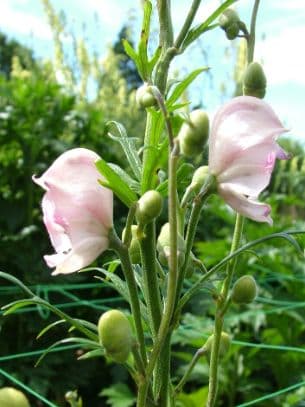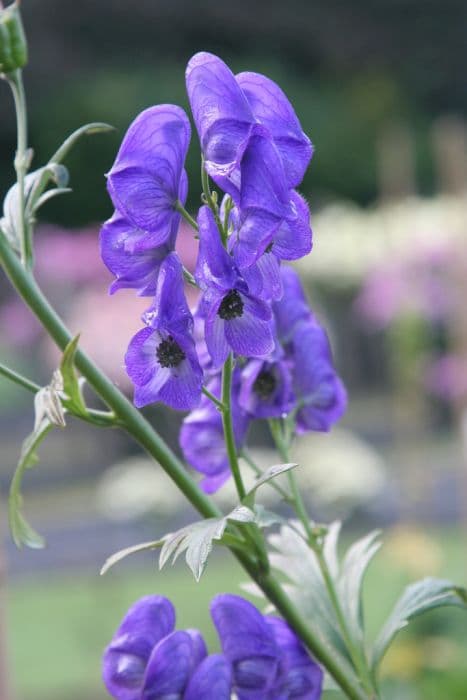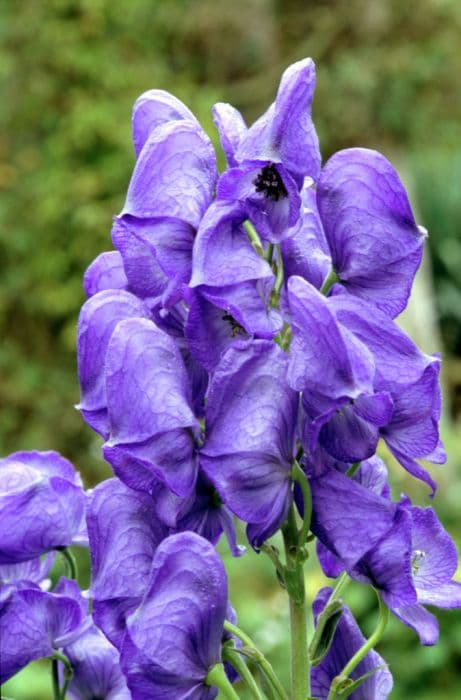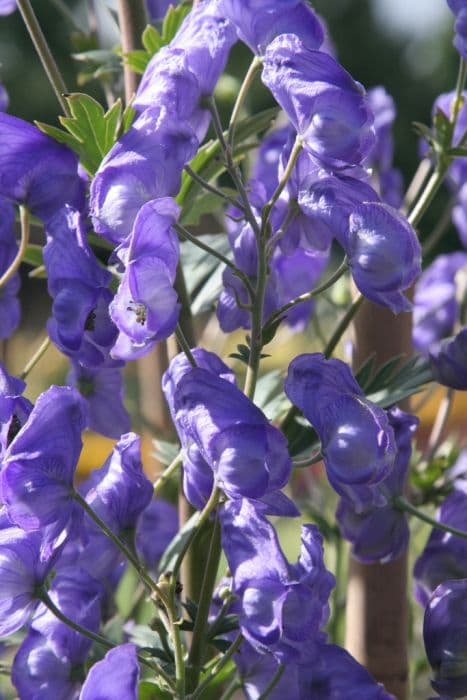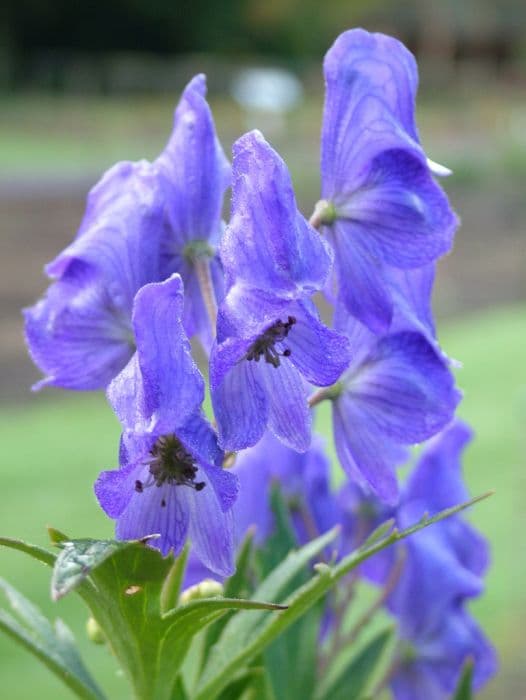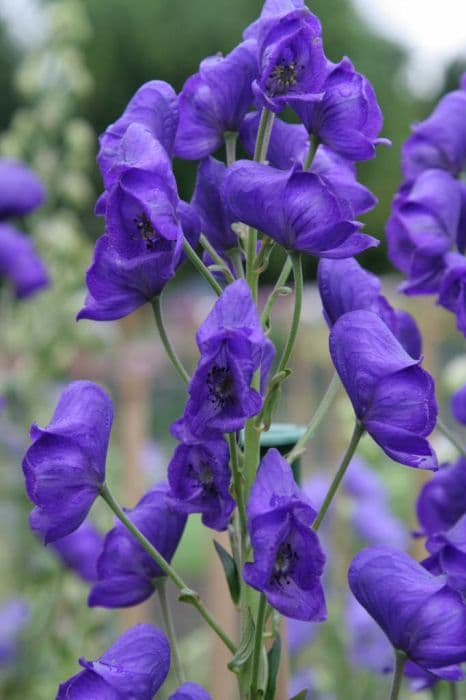Fair Maids of France Ranunculus aconitifolius 'Flore Pleno' (d)

ABOUT
Commonly known as the fair maids of France, the plant showcases a lush and dense green foliage with deeply lobed leaves. These leaves closely resemble those of the aconite plant, with a dark green color and a slightly shiny finish adding to their visual appeal. However, it is the flowers of this plant that truly capture attention— they are double, meaning they have multiple layers of petals, presenting a full and fluffy appearance reminiscent of tiny pom-poms or elegant rosettes. These blossoms are a pure, snowy white, contrasting strikingly with the green of the leaves. The flowers cluster together atop branched stems, forming a cloud-like display of white that can add a touch of whimsy to any garden. These charming attributes make the fair maids of France a beloved choice for gardeners seeking a cottage-style aesthetic or simply wishing to add some romantic blooms to their outdoor space.
About this plant
 Names
NamesFamily
Ranunculaceae
Synonyms
Fair Maids of France, Fair Maids of Kent, Bachelor's Buttons, Double White Bachelor's Buttons, White Bachelor's Button
Common names
Ranunculus aconitifolius var. pleniflorus, Ranunculus aconitifolius f. pleniflorus.
 Toxicity
ToxicityTo humans
The plant commonly known as Bachelor's Button is considered toxic to humans if ingested. The toxicity is due to the presence of protoanemonin, a compound released from the glycoside ranunculin when plant cells are crushed. This compound can cause severe irritation to the mouth, throat, and gastrointestinal system if ingested. Symptoms of poisoning include nausea, vomiting, diarrhea, dizziness, and abdominal pain. In severe cases, it can lead to convulsions, tremors, and further complications potentially resulting in respiratory and cardiac problems.
To pets
Bachelor's Button is also toxic to pets such as cats and dogs. As in humans, the toxicity arises from protoanemonin, which is irritating to the animal's mouth, digestive tract, and can lead to drooling, vomiting, diarrhea, and weakness. In more serious cases, ingestion can result in tremors, seizures, and other systemic effects. If you suspect your pet has ingested any part of this plant, it is important to seek veterinary care immediately.
 Characteristics
CharacteristicsLife cycle
Perennials
Foliage type
Deciduous
Color of leaves
Green
Flower color
White
Height
2 feet (60 cm)
Spread
1 feet (30 cm)
Plant type
Herb
Hardiness zones
3
Native area
Europe
Benefits
 General Benefits
General Benefits- Ornamental value: Ranunculus aconitifolius 'Flore Pleno', commonly known as fair maids of France, has double white flowers that provide aesthetic appeal to gardens and landscapes.
- Pollinator attraction: The flowers attract bees and other pollinators, supporting biodiversity in the garden environment.
- Low maintenance: This plant is known for being relatively easy to care for, requiring minimal maintenance once established.
- Shade tolerance: Fair maids of France can thrive in partly shaded environments where other plants might struggle.
- Cottage garden style: Ideal for creating a traditional cottage garden look due to its quaint and charming appearance.
 Medical Properties
Medical PropertiesThis plant is not used for medical purposes.
 Air-purifying Qualities
Air-purifying QualitiesThis plant is not specifically known for air purifying qualities.
 Other Uses
Other Uses- Ranunculus aconitifolius 'Flore Pleno', commonly known as Bachelor's buttons, can be used as a natural dye, where the petals provide a subtle yellow to fabric.
- The plant can serve as a learning tool in botany education, helping students understand the characteristics of the Ranunculaceae family.
- Bachelor's buttons can be utilized in eco-friendly confetti, as the petals are biodegradable and far less harmful to the environment than plastic alternatives.
- It can be incorporated into artistic projects, such as flower pressing, to create natural artwork and preserve the beauty of the blossoms.
- Use the flowers for a natural potpourri, either alone or mixed with other flowers and spices to scent your home.
- Bachelor's buttons can serve as a living mulch, as their dense growth can help retain soil moisture and suppress weeds.
- It can be used in rituals or ceremonies that require biodegradable materials, serving as a symbol of purity or love.
- The petals can be part of a natural insect-repelling mixture when combined with other repelling plants and flowers.
- Bachelor's buttons can be included in crafts for children, such as making bookmarks or homemade paper with flower inclusions.
- The flower is sometimes used in ceremonies as an eco-friendly tossing flower alternative to rice or synthetic materials.
Interesting Facts
 Feng Shui
Feng ShuiThe plant Bach's Buttons is not used in Feng Shui practice.
 Zodiac Sign Compitability
Zodiac Sign CompitabilityThe plant Bach's Buttons is not used in astrology practice.
 Plant Symbolism
Plant Symbolism- Charm and Attraction: Often referred to by its common name, the Fair Maids of France, this ranunculus variety is said to symbolize charm due to its layers of delicate, intricate petals that lure in admirers just as a charming person might.
- Radiant Charm: The lush, full blooms of the Fair Maids of France represent radiating charm, suggesting that the beauty of the flower can captivate those around it effortlessly.
- Attraction and Flirting: Because of its whimsical appearance, this plant is also associated with flirtation, echoing the light and playful nature of an innocent dalliance.
 Water
WaterThe Bachelor's Button, or Fair Maids of France, prefers consistent moisture and should be watered thoroughly whenever the top inch of soil feels dry to the touch. This typically means providing water once or twice a week, depending on weather conditions and soil drainage. Ensure to water at the base of the plant to keep foliage dry and reduce the risk of disease. During the active growth period in spring and summer, the plant may require more frequent watering. Use roughly one gallon of water per plant to maintain even moisture, adjusting as needed during dry spells or rainy periods.
 Light
LightFor the Bachelor's Button, or Fair Maids of France, choose a location that receives full sun to partial shade. The ideal spot provides morning sunlight and protection from the intense heat of the midday sun, which is particularly important in hotter climates. Adequate light is crucial for the best flowering, but too much direct sun in the peak of summer can be detrimental.
 Temperature
TemperatureThe Bachelor's Button, or Fair Maids of France, thrives in temperatures ranging from 60°F to 75°F, but can tolerate temperatures down to about 50°F and up to 80°F. It's important to protect the plant from extreme heat and frost, as this can damage the delicate foliage and flowers. The moderate temperature range supports healthy growth and abundant blooms.
 Pruning
PruningPruning the Bachelor's Button, or Fair Maids of France, is essential to remove spent flowers and encourage further blooming. This deadheading can be done throughout the flowering season. Cut back the foliage by one-third after the first flush of flowers to promote a second bloom period. The best time for major pruning is in late winter or early spring before new growth begins.
 Cleaning
CleaningAs needed
 Soil
SoilFair Maids of France, or Bachelor's Buttons, thrives in rich, moist but well-draining soil with pH ranging from 6.0 to 7.0. A mix of garden soil, compost, and a bit of sand for improved drainage is recommended to create an ideal growing environment.
 Repotting
RepottingBachelor's Buttons should be repotted every 2 to 3 years to rejuvenate the soil and provide space for growth. The best time to repot is in the early spring just before new growth begins.
 Humidity & Misting
Humidity & MistingBachelor's Buttons prefer average to high humidity levels but are quite adaptable. Maintaining a humidity level of around 40-60% is ideal for this plant, though it can tolerate variations.
 Suitable locations
Suitable locationsIndoor
Place in bright indirect light, keep soil moist.
Outdoor
Plant in part shade, water regularly, fertile soil.
Hardiness zone
3-7 USDA
 Life cycle
Life cycleRanunculus aconitifolius 'Flore Pleno', commonly known as Fair Maids of France, begins its life cycle as a seed, which will germinate in favorable conditions of moisture and temperature, usually in spring. The seedling develops into a mature plant with a characteristic clumping habit and deeply divided, dark green leaves. This perennial herbaceous plant undergoes vegetative growth and produces multiple stalks, each topped with double, white, button-like flowers that bloom in late spring or early summer. Once pollinated, possibly by insects attracted to its bright flowers, the plant will produce fruits called achenes, which contain the seeds for the next generation. During the late summer or fall, the Fair Maids of France naturally dies back, with the above-ground portions going dormant while the roots or underground parts store energy for the next growing season. The plant re-emerges from its rootstock each spring, repeating its life cycle.
 Propogation
PropogationPropogation time
Spring
The most popular method of propagating the Bachlor's Buttons, also known as Ranunculus aconitifolius 'Flore Pleno', is by division. Division is best done in the autumn after the plant has flowered and the foliage has died back. To propagate by division, carefully dig up the entire clump of the plant, keeping as much of the root system intact as possible. Gently break the clump into smaller sections, making sure that each section has at least one growth bud. Replant these divisions immediately, spacing them about 12 inches (approximately 30 centimeters) apart to allow room for growth. Water them well to help establish the new plants. This method is straightforward and often leads to successful multiplication while maintaining the characteristics of the parent plant.
